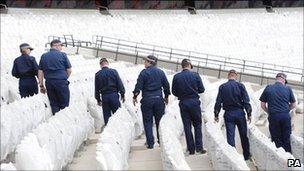Tough times ahead for London's police
- Published

Many thousands of police officers will be on duty in London during the Olympic Games
As Britain enters the final 12-month countdown to the London Olympics, the biggest ever peacetime security operation in its history, the senior ranks of the Metropolitan Police are in turmoil.
The Met has lost its highly respected Commissioner, Sir Paul Stephenson and its top counter-terrorism policeman, Assistant Commissioner John Yates, who have both resigned over the phone hacking scandal.
Mr Yates will be replaced for the interim by Assistant Commissioner Cressida Dick but the sudden departure of such a senior counter terrorism officer will be a blow for Olympic security planners.
By the end of this year much of the focus of Britain's counter-terrorism efforts will have shifted towards planning for the Olympics, during which the national terrorism threat level is expected to rise back up to "Severe", its second highest on a scale of five.
Secret documents
About 120 heads of state are expected to congregate in east London next summer while close to 350,000 visitors are expected daily at the Olympic Park - 10,000 police officers and 13,000 security officers will be deployed across over 30 venues.
Scores of MI5 intelligence officers in the Security Service will be transferred from present duties to concentrate on the Olympics.
The Metropolitan Police, working closely with the Home Office, the Security Service and the Army, will need both focus and leadership.
The Met's senior officer in charge of Olympic security, Assistant Commissioner Chris Allison, remains in post and it will now fall to him to ensure there is minimal disruption following Mr Yates's sudden departure.
It is just two years and three months since Mr Yates was hastily appointed to Specialist Operations when his predecessor Bob Quick was forced to resign after carrying secret documents on a forthcoming operation in full view of Downing Street journalists.
Insiders say he has done well on counter-terrorism in that time, with London Mayor Boris Johnson paying tribute to his work today, saying: "Millions of Londoners are safer thanks to the efforts of him and of his team."
Controversial appointment
This morning Mr Yates said he had no intention of resigning but by this afternoon he is understood to have changed his mind after being told he was to be suspended pending an investigation into his alleged failure to fully prosecute the police enquiry into phone hacking.
Mr Yates had, of course, a number of able officers directly beneath him and a police spokesman has said there are no plans to make any immediate changes to those posts. Top of these is Deputy Assistant Commissioner Stuart Osborne, who is the Senior National Co-ordinator for Counter Terrorism.
Beneath him is a commander who runs the day-to-day business of the Met's SO15 Counter Terrorism Command.
But more controversial will be the appointment as Mr Yates's interim successor of Asst Commissioner Cressida Dick, who was running operations when police shot dead the unarmed Brazilian electrician Jean-Charles de Menezes at Stockwell tube station in 2005.
While many of the public will associate her name with this disastrous chapter in police history, she was subsequently cleared of any personal blame and is now the most senior woman in the Met, becoming the first female Asst Commissioner in 2009.
Over the next year she will have her work cut out.